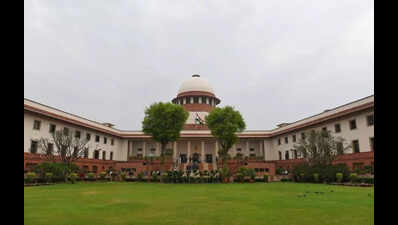
News
October 08, 2025
SC asks Punjab to specify timeline for panel on pension commutation recovery
The Supreme Court has directed the Punjab government to provide a clear timeline for the formation of a committee tasked with addressing the contentious issue of recovering pension commutation amounts from retired employees. The court's intervention comes amidst growing concerns about the fairness and legality of these recoveries, which have sparked widespread discontent among pensioners across the state.
The issue centers on the practice of recovering a portion of the commuted pension (a lump sum payment received upon retirement in exchange for a reduced monthly pension) if a pensioner is re-employed by the government or a government-controlled entity. While the government argues that this recovery is in line with established rules and aims to prevent double benefits, many retired employees contend that it places an undue financial burden on them, especially considering the rising cost of living. They argue that their re-employment is often driven by necessity and that the recovery significantly diminishes their post-retirement income.
The Supreme Court's directive underscores the urgency of resolving this long-standing dispute. The formation of a committee is seen as a crucial step towards a comprehensive review of the policy and its impact on pensioners. The court has emphasized the need for the Punjab government to outline a specific timeframe for the committee's establishment, ensuring that the process is initiated and completed without undue delay. This timeline will allow for better monitoring of the progress and provide pensioners with a clearer understanding of when they can expect a resolution to their grievances.
The committee is expected to comprise representatives from various stakeholders, including government officials, legal experts, and representatives of pensioner associations. Its mandate will likely involve examining the existing rules and regulations governing pension commutation recovery, assessing their validity and fairness, and recommending appropriate amendments or alternative solutions.
The outcome of this review could have significant implications for thousands of retired employees in Punjab. A favorable resolution could alleviate their financial burdens and provide them with greater security in their post-retirement years. Conversely, a prolonged delay or an unfavorable outcome could exacerbate their concerns and further fuel discontent. The Supreme Court's intervention signals a commitment to ensuring that the issue is addressed fairly and expeditiously, safeguarding the rights and welfare of pensioners in the state. The court's next hearing on the matter is eagerly awaited by all concerned.
The issue centers on the practice of recovering a portion of the commuted pension (a lump sum payment received upon retirement in exchange for a reduced monthly pension) if a pensioner is re-employed by the government or a government-controlled entity. While the government argues that this recovery is in line with established rules and aims to prevent double benefits, many retired employees contend that it places an undue financial burden on them, especially considering the rising cost of living. They argue that their re-employment is often driven by necessity and that the recovery significantly diminishes their post-retirement income.
The Supreme Court's directive underscores the urgency of resolving this long-standing dispute. The formation of a committee is seen as a crucial step towards a comprehensive review of the policy and its impact on pensioners. The court has emphasized the need for the Punjab government to outline a specific timeframe for the committee's establishment, ensuring that the process is initiated and completed without undue delay. This timeline will allow for better monitoring of the progress and provide pensioners with a clearer understanding of when they can expect a resolution to their grievances.
The committee is expected to comprise representatives from various stakeholders, including government officials, legal experts, and representatives of pensioner associations. Its mandate will likely involve examining the existing rules and regulations governing pension commutation recovery, assessing their validity and fairness, and recommending appropriate amendments or alternative solutions.
The outcome of this review could have significant implications for thousands of retired employees in Punjab. A favorable resolution could alleviate their financial burdens and provide them with greater security in their post-retirement years. Conversely, a prolonged delay or an unfavorable outcome could exacerbate their concerns and further fuel discontent. The Supreme Court's intervention signals a commitment to ensuring that the issue is addressed fairly and expeditiously, safeguarding the rights and welfare of pensioners in the state. The court's next hearing on the matter is eagerly awaited by all concerned.
Category:
World